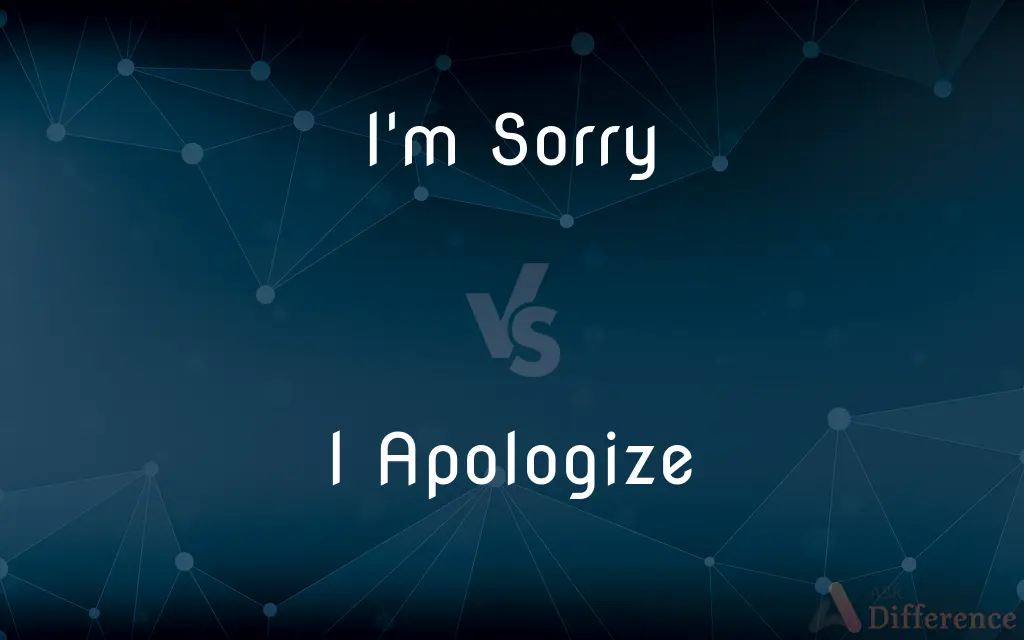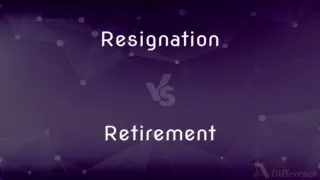I'm Sorry vs. I Apologize — What's the Difference?
By Tayyaba Rehman — Published on October 6, 2023
I'm Sorry" expresses regret or sympathy, while "I Apologize" is a formal way of admitting fault or wrongdoing.

Difference Between I'm Sorry and I Apologize
Table of Contents
ADVERTISEMENT
Key Differences
"I'm Sorry" is often used in casual settings and can denote both regret and empathy. On the other hand, "I Apologize" is a more formal expression and directly acknowledges a mistake or fault.
When someone says "I'm Sorry," it can be an emotional response indicating that they feel bad about something, whether or not they're responsible. "I Apologize," however, usually implies accepting responsibility for an action or mistake.
Context matters. In personal relationships, "I'm Sorry" can convey genuine emotions and sympathy. In professional settings, "I Apologize" might be preferred as it clearly acknowledges an error without necessarily delving into emotional nuances.
Linguistically, "I'm Sorry" is a contraction of "I am" with the adjective "sorry," denoting a state of feeling. "I Apologize" uses the verb "apologize," focusing on the act of apologizing.
Both phrases can be used interchangeably in many situations, but the choice between "I'm Sorry" and "I Apologize" can subtly shift the tone and meaning of an apology based on the context and the relationship between the individuals involved.
ADVERTISEMENT
Comparison Chart
Tone
Casual, emotional
Formal, direct
Implication
Can denote regret or empathy
Usually implies accepting responsibility
Usage
Personal relationships, informal settings
Professional settings, formal acknowledgments
Linguistic Structure
Contraction with an adjective
Uses a verb
Responsibility
May or may not accept fault
Typically accepts fault
Compare with Definitions
I'm Sorry
An expression of regret or remorse.
I'm sorry for forgetting your birthday.
I Apologize
An expression of regret for causing inconvenience.
I apologize for any confusion caused.
I'm Sorry
A way to convey sympathy.
I'm sorry to hear about your loss.
I Apologize
An explicit acknowledgment of fault.
I apologize for not meeting the deadline.
I'm Sorry
A polite response when inconveniencing someone.
I'm sorry, can you repeat that?
I Apologize
A formal admission of wrongdoing.
I apologize for the oversight.
I'm Sorry
An informal apology.
I'm sorry for being late.
I Apologize
A way to rectify misunderstandings.
I apologize if my words came out wrong.
I'm Sorry
An acknowledgment of a mistake.
I'm sorry, I should have listened to you.
I Apologize
A professional way to admit a mistake.
I apologize for the delay in response.
Common Curiosities
Is "I'm Sorry" more formal than "I Apologize"?
No, "I Apologize" is generally more formal than "I'm Sorry."
What does "I'm Sorry" linguistically combine?
"I'm Sorry" is a contraction of "I am" with the adjective "sorry."
Can "I'm Sorry" be used to express sympathy?
Yes, "I'm Sorry" can express both regret and sympathy.
Is "I'm Sorry" always an acknowledgment of fault?
No, "I'm Sorry" can express regret without admitting fault.
Which expression is more direct in admitting an error?
"I Apologize" is more direct in admitting an error.
Does "I Apologize" carry emotional nuances?
"I Apologize" is less emotional and more focused on acknowledging an error.
Which phrase typically implies accepting responsibility?
"I Apologize" usually implies accepting responsibility.
In what setting might "I Apologize" be preferred?
In professional settings, "I Apologize" might be preferred.
Which is more suitable for personal relationships?
"I'm Sorry" is often more suitable in personal relationships.
Can both phrases be used interchangeably?
Often, but the choice can shift the tone and meaning of an apology.
Share Your Discovery

Previous Comparison
Resignation vs. Retirement
Next Comparison
Cost Audit vs. Financial AuditAuthor Spotlight
Written by
Tayyaba RehmanTayyaba Rehman is a distinguished writer, currently serving as a primary contributor to askdifference.com. As a researcher in semantics and etymology, Tayyaba's passion for the complexity of languages and their distinctions has found a perfect home on the platform. Tayyaba delves into the intricacies of language, distinguishing between commonly confused words and phrases, thereby providing clarity for readers worldwide.












































